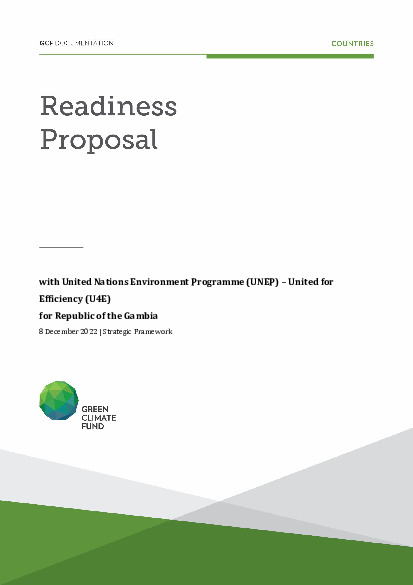National Framework for Leapfrogging to Energy- Efficient and Climate Friendly Air Conditioners and Refrigerators in The Gambia

National Framework for Leapfrogging to Energy- Efficient and Climate Friendly Air Conditioners and Refrigerators in The Gambia
Despite the rising electricity demand, only 56% of The Gambian population has access to electricity as of 20171. The Gambia’s electricity generation is solely dependent on imported petroleum products and the country has the highest electricity tariff in the western African region. Absence of regulatory frameworks and Minimum Energy Performance Standards (MEPS) for appliances in The Gambia has resulted in inefficient products accounting for a major market share and attributing to high energy consumptions and associated carbon emissions.
Cooling brings improvement to the productivity and life of people and is an essential service in the health sector and a key aspect of food security. The demand for air conditioners and refrigerators in The Gambia is predicted to rise up to 44% by 20401. Meeting this rising demand with inefficient air conditioners and refrigerators poses a severe strain on the electricity grid. Energy-efficient appliances de-escalate the pressure on the electricity grid through reduced blackouts and brownouts and provide means to build additional capacity generation. Moreover, it is imperative to establish a strong policy and regulatory framework and promote higher efficiency appliances in order to meet the ambitious political targets set by The Gambia.
Absence of MEPS and lack of dedicated policies on import restrictions coupled with limited information on awareness and benefits of energy-efficient products prevents The Gambia from inducing a sustainable market transformation in favour of higher efficiency products. The National Energy Efficiency Action Plan of The Gambia has set sectorial energy efficiency targets for 2020 and 2030 with no explicit targets for cooling products.
This project aims to develop an integrated policy strategy that results in a comprehensive legislative framework for energy-efficient air conditioners and refrigerators in The Gambia that will ultimately reduce greenhouse gas (GHG) emissions. The project will include development of a National Cooling Action Plan (NCAP) which will be based on a robust market assessment and a policy framework for MEPS and labelling scheme for air conditioners and refrigerators. Additionally, the proposal includes capacity building for the Ministry of Petroleum and Energy (MOE) and key stakeholders. In the long-term, the project will catalyse broader market transformation for energy efficiency in the Gambia.
The key beneficiaries of this project are government stakeholders, which include the policymakers from the MOE, as well as the participants from the Policy Working Group (PWG). All stakeholders will receive a capacity building training on energy- efficient appliances and participate on knowledge exchanges throughout the project.
The long-term implications of the proposal will have a positive impact on the general public of the Gambia as the project will enable a transition to more sustainable electricity grid and result in cheaper electricity bills. The project will place further attention to the regional harmonization of legislation to propose a wide acceptance and minimize potential trade barriers. A close attention will be given especially to Senegal as The Gambia is landlocked into the country.